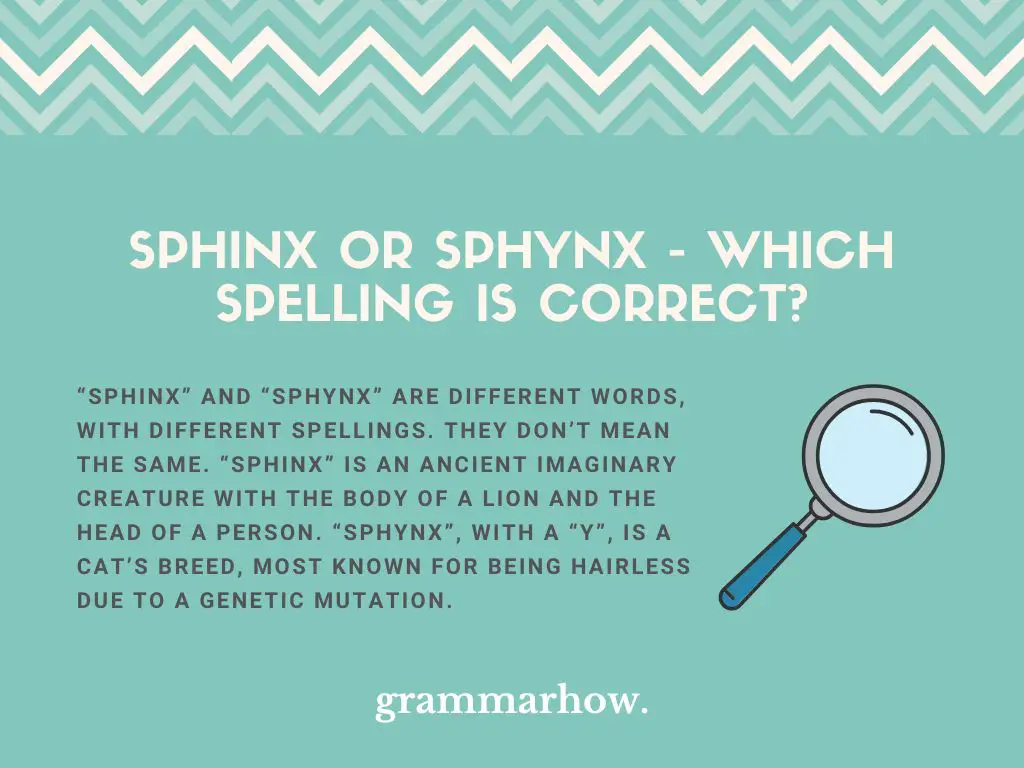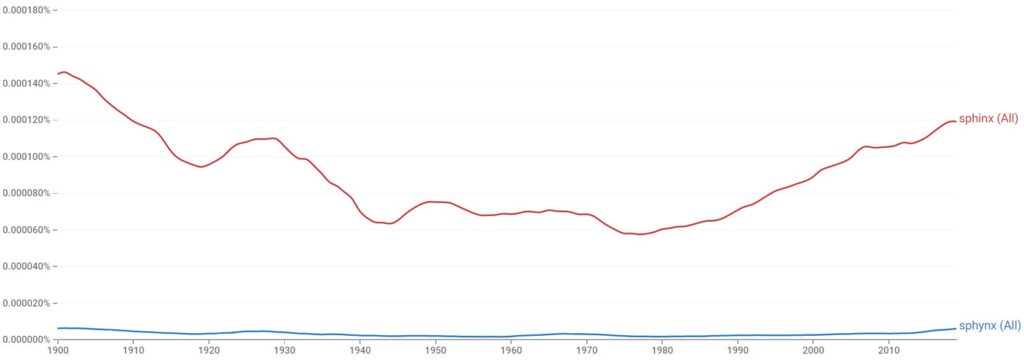Are the words “Sphinx” and “Sphynx” synonyms, or alternate forms of the same words, that we can use interchangeably?
We want to know that’s the meaning of those words, and in case they are different, when and how we should use each of them. Let’s find out the differences!
Sphinx or Sphynx – Which Spelling Is Correct?
“Sphinx” and “Sphynx” are different words, with different spellings. They don’t mean the same. “Sphinx” is an ancient imaginary creature with the body of a lion and the head of a person. “Sphynx”, with a “y”, is a cat’s breed, most known for being hairless due to a genetic mutation.

Take a look at some examples:
- The famous Sphinx is located in the desert of Cairo in Egypt.
- Julia has a sphynx cat named Seuss.
Although very similar in spelling, “Sphinx” and “Sphynx” aren’t synonyms. They don’t mean the same, and, consequently, can’t interchange. They are different words that indicate different things. Keep that in mind when choosing which form to use in your communications.
Let’s look into each separately.
Sphinx
“Sphinx” is the name of a mythological creature that has a human head and a lion body. Frequently, it has a women’s head and wings, too. Common in Greek stories, the Sphinx is also a known statue in Egypt, located near the pyramids in the desert.
You can use this word every time you refer to the imaginary creature. The definition found in The Cambridge Dictionary is very similar to this and says, “an ancient imaginary creature with a lion’s body and a person’s head”.
Take a look at some examples:
- I would love to see the Sphinx in person one day.
- The hotel had a replica sphinx statue, that looked very weird.
- The sphinx is a mythological creature with a lion’s body, a woman’s head, and wings.
- There is a sphinx moth in the house.
- Laura looked like a sphinx while receiving the bad news.
- John refused to take part in the fight, standing still like a sphinx while it was happening.
“Sphinx” refers always only to the mythological creatures or their characteristics. There’s no other use for this word, with this spelling.
“Sphynx” refers to a completely different thing, as we’ll see now.
Sphynx
“Sphynx” is a cat’s breed, mostly known for being hairless due to a genetic mutation. They’ve become very popular in recent years because, without the fur, they’re considered hypoallergenic – which is a great thing for those who wish to have a cat but are allergic to them.
The Cambridge Dictionary doesn’t acknowledge “Sphynx” as a word. However, The Merriam-Webster does, and the definition it gives for this word is the following: “any of a breed of large-eared virtually hairless cats that originated as a spontaneous mutation”.
Take a look at the examples below:
- Hank wants to get a sphynx cat.
- Have you ever pet a sphynx cat and felt their skin?
- Lorena’s sphynx cat always wears cute little sweaters.
- Sphynx cats are very extroverted.
- Purebred sphynx cats are very expensive.
Which Is Used the Most?
“Sphinx” and “Sphynx” are words that have completely different meanings – despite sharing a very similar spelling. Still, we’re curious to find out which one of them is used more often.
Let’s take a look at the graph from Google Ngram Viewer below, to compare.

“Sphinx” is the word that is used more often. We think it makes sense, because “Sphinx”, as a mythological creature, has been known for centuries and has always been part of conversations and such.
“Sphynx” is a relatively new cat breed. At the very least, it has become trendy more recently. It’s not surprising that “Sphynx” wouldn’t appear in the graph as much.
Either way, keep in mind that both words are correct and you can use them, as long as you apply the correct word to the appropriate meaning.
Final Thoughts
“Sphinx” and “Sphynx” are different words, despite the relatively similar spelling. “Sphinx” is a mythological creature, depicted in the big statue in Cairo, Egypt. “Sphynx” is a hairless breed of cat, due to a genetic mutation. You can use both words, as long as you mind the correct meaning.

Martin holds a Master’s degree in Finance and International Business. He has six years of experience in professional communication with clients, executives, and colleagues. Furthermore, he has teaching experience from Aarhus University. Martin has been featured as an expert in communication and teaching on Forbes and Shopify. Read more about Martin here.
